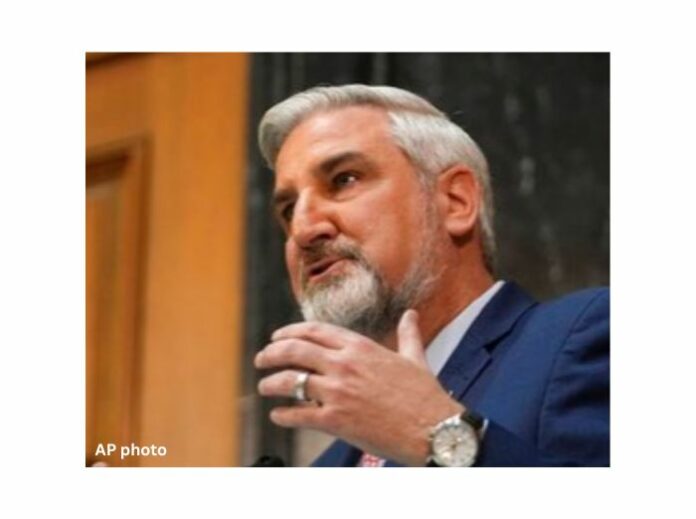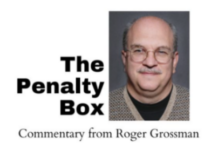By Leslie Bonilla Muñiz
Indiana Capital Chronicle
INDIANAPOLIS — Indiana Gov. Eric Holcomb praised Indiana’s economic “position of strength” in his annual State of the State address Tuesday evening — and argued the state can afford to invest in “needs” like economic development, public health, schools and public safety.
The Republican also unveiled a $30 million grant for what would be Indiana’s longest trail. He spoke in front of a joint convention of the Republican-dominated Indiana General Assembly.
“Because our revenue and population are both growing, we have the ability — rather, the obligation — to fuel that growth and utilize reserves for one-time projects, even while we maintain a healthy surplus,” Holcomb said, “while protecting our state’s AAA credit rating.”
“We have the financial wherewithal to do so, unlike some other states that balance their books with high taxes and debt,” Holcomb added, to applause and laughter.
The Department of Natural Resources will spend the last $29.5 million from its $150 million Next Level Trails program on acquisition and development costs for the 62-mile Monon South Trail, Holcomb announced. The trail, along a former rail corridor, will span five counties in Southern Indiana, and lay within 10 miles of about 440,000 Hoosiers.
“The Monon South Trail will preserve a piece of our Hoosier history while promoting quality of place in our rural communities,” Holcomb said in a news release Tuesday. In his speech, he also asked lawmakers to approve $50 million more in trails funding, plus $25 million for a land conservation program.
Holcomb also took the chance to talk about the legislative priorities he released last week, making his case in front of the lawmakers who control the state’s purse strings.
‘Not a day to waste’ on public health
He acknowledged the state’s woeful public health standings for smoking, obesity, mental health care access and childhood vaccinations — 45th, 46th, 43rd and 41st, respectively — and reiterated an ask for major investments in public health: $347 over the course of the next two-year budget.
Willing local governments would have to pony up funds for the 80-20 state-local mix.
“We don’t have a day or a dollar – certainly not a life – to waste,” Holcomb told legislators, “so taking the next four months [of the legislative session] to get this right: nothing could be more important.”
House Speaker Todd Huston said his caucus members “recognize that additional investments [are] needed. But key to that, he said, is tracking the outcomes of those investments using “metrics for success.”
Ditching the ‘disguised tax’ of textbooks
The governor also asked lawmakers to prioritize education, asking for an increase of $1.1 billion toward K-12 tuition support and an additional $120 million to pay for textbooks and curriculum material.
Indiana is one of just seven states in which public school students’ families shoulder the cost of textbooks and other curriculum materials — which Holcomb dubbed a “disguised tax.”
Senate President Pro Tempore Rodric Bray was unenthusiastic about the proposal in comments to media after Holcomb’s speech. He acknowledged that “public education is super important” but said the caucus would have to discuss “whether or not we can get to that with the textbooks.”
Huston, meanwhile, emphasized using education dollars effectively as he sidestepped a question about Holcomb calling textbook fees a hidden tax.
“We’re just working through the mechanics of it all and thinking about the best way to do it,” he told reporters.
Democrats have long supported further investments in education, including free curriculum materials at public schools – but recognized the governor’s prioritization of it and other education proposals isn’t a free ride to success.
Senate Minority Leader Greg Taylor told reporters that, as in 2020, he found himself in the “interesting position” of “supporting a lot of the projects that the governor wants to do, while his own political party and colleagues are questioning whether or not we should do certain things.”
“I think he’s got a long way to go to get my colleagues on the other side of the aisle to support it,” Taylor said of Holcomb’s ideal budget.
What counts as success?
Holcomb also called on lawmakers to focus on public safety by boosting money for school safety grants, court technology upgrades, a “true” statewide firefighting training system, state police pay and more.
“Here in Indiana, we have a well-run, soundly financed state – and the word is out!” Holcomb said. “… Investors are giving us their vote of confidence. They’re creating industries and careers here. They see their growth and future here. Let’s prove them right!”
But Democrats were skeptical of what they framed as a business-first approach.
“I’m not sure [the AAA credit rating] really means so much to Hoosiers,” Sen. Shelli Yoder, D-Bloomington, told reporters. “When it comes to that AAA rating, Hoosiers are trying to put food on the table, pay their bills, find affordable housing and afford childcare.”
“We’re saying from the Democrat policy standpoint, it’s time to take a look at households and not just businesses,” Taylor said.
The Indiana Capital Chronicle is an independent, nonprofit news organization dedicated to giving Hoosiers a comprehensive look inside state government, policy and elections. The site combines daily coverage with in-depth scrutiny, political awareness and insightful commentary.
You can read the original version of the
.





